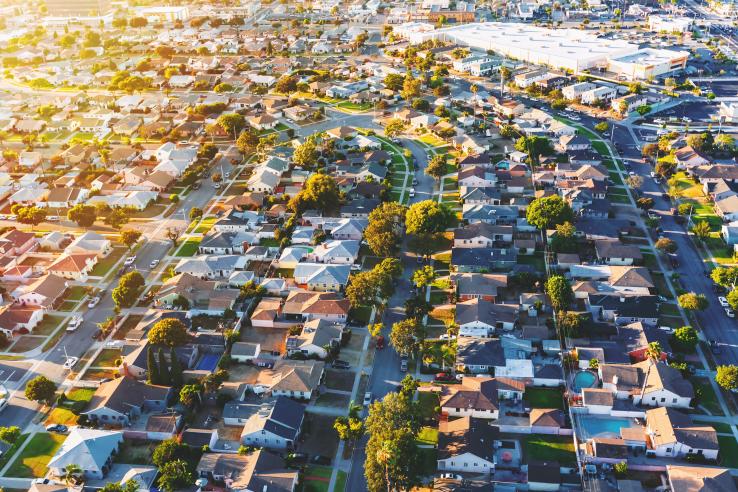
The LA Homelessness Evaluation Network: Supporting service providers in their efforts to generate and use evidence

On one night in January 2022, over 580,000 people were experiencing homelessness in the United States. Roughly one-third of this population was living in California, with over one-tenth—more than 65,000 people—in Los Angeles (LA) County alone. Given the scale of homelessness in LA and the urgency for solutions for those in need, it is more important than ever to generate evidence to address unanswered questions on what works best to combat homelessness and why. J-PAL North America is partnering with the Conrad N. Hilton Foundation to offer LA-based homeless service providers a supportive “community of practice” around rigorous research. Through this effort, we aim to bolster organizations’ ability to generate and use evidence to inform decision-making as they support communities experiencing homelessness.
Homelessness in Los Angeles
LA County is home to the largest number of individuals experiencing homelessness in any of the nation’s Continuums of Care and the largest number of unsheltered people in the country, with many sleeping in tents, makeshift shelters, and vehicles. Homelessness affects thousands of individuals and families each day who are in need of a safe place to call home and who face a myriad of related challenges such as financial stability, health, and safety.
This vast and growing issue, which disproportionately affects Black, Latino/a, and Indigenous communities, prompted LA City Mayor Karen Bass to declare a state of emergency on homelessness when she took office last year. This decree enables more resources to go toward fighting homelessness, and highlights the need for further evaluation on homelessness reduction and prevention strategies to ensure resources are used effectively. Emergency declarations on homelessness have since been issued by LA County and other cities in the region.
There are multiple drivers of homelessness in the LA region, including a lack of affordable housing, high costs of living, and the need for increased support for individuals with mental illness and substance use disorders. It is estimated that LA County has a rental vacancy of just 3.5 percent and faces a shortage of nearly 500,000 affordable homes. In the city of LA, it is estimated that for every 207 people who find stable housing each day, another 227 become homeless. Some of LA’s zoning policies also limit the ability to build multi-family housing, which contributes to the tight market. Building affordable housing can be an expensive and lengthy process, with some affordable housing developments in California costing more than $1 million per apartment to build.
Gaps in evidence related to homelessness reduction and prevention
Across LA County’s 88 cities, there is an extensive network of organizations and stakeholders working diligently to support unhoused families and individuals. Yet they face several challenges in conducting this work, including resource and capacity constraints and a lack of rigorous evidence about which policies and programs are the most effective. In order to maximize the impact of the emergency declarations in the region and most effectively allocate resources to combat homelessness, it is critical that policymakers and service providers invest in and implement evidence-informed programs.
Various evaluations have identified some promising programs related to homelessness reduction and prevention that have informed policy change. For example, the Housing First model—which prioritizes the provision of permanent housing with support and no preconditions—has grown in popularity in recent decades, in part due to evidence on its effectiveness.
There are numerous open and testable research questions about the best ways to combat homelessness, particularly for different populations and in different contexts. In addition to existing evidence-informed models, organizations and government agencies are trying out new, innovative solutions. For example, Mayor Bass issued an executive directive to explore turning city property into temporary and permanent housing in order to increase housing supply at lower costs. Innovations such as this are essential for combatting such a complex challenge. They also create opportunities to generate data and share lessons on what works.
Supporting LA-based service providers to generate policy-relevant evidence
To lay the foundation for evidence generation and use among LA-based homeless service providers, J-PAL North America—in partnership with the Conrad N. Hilton Foundation—is creating a supportive “community of practice” around rigorous research: the LA Homelessness Evaluation Network. This model builds from J-PAL North America’s previous partnership engagement work, including the Bay Area Evaluation Incubator, which supports Bay Area service providers in implementing and evaluating cash transfer programs.
Over the next year, J-PAL North America will work to establish a network of LA-based organizations that are well-positioned to design and develop randomized evaluations of their programs that can ultimately help address open and critical questions related to homelessness prevention and housing stability. LA Homelessness Evaluation Network participants will attend workshops on impact evaluation and ethical evaluation design, receive small group support from J-PAL staff in scoping potential evaluation ideas, and have opportunities for peer learning and connection. Activities will be informed by and tailored to the organizations’ needs, being mindful of the day-to-day challenges organizations are facing as they work tirelessly to address homelessness in their communities.
Those interested in learning more about this engagement can contact Bridget Mercier, J-PAL North America’s policy and training manager, for more information. Information on using rigorous impact evaluations to answer policy questions related to homelessness and housing stability can be found on our website. If you would like to receive updates on our work in LA as well as other projects, subscribe to our Addressing Homelessness and Housing Stability newsletter.
Related Content

BAE Incubator partner series, part five: Seeking systems-level change to address housing instability

How policymakers can ensure they’re supporting housing policies that work: Demystifying randomized evaluations


